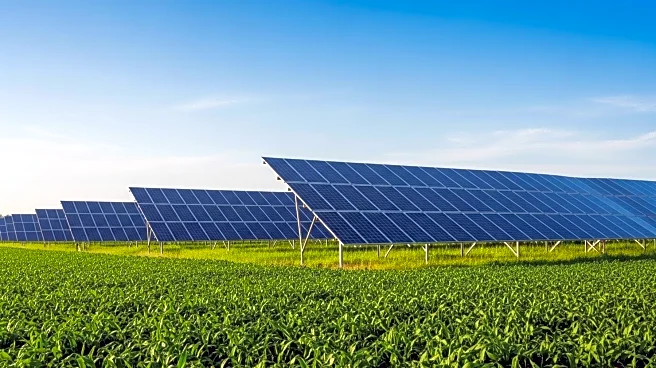What's Happening?
The North American Agrivoltaics Awards program has highlighted the growing agrivoltaic movement in the U.S., showcasing its transition from demonstration projects to a full-fledged industry. Agrivoltaics, which integrates solar energy production with agricultural activities, is gaining traction as a sustainable solution for farmers. The awards recognized projects like Rutgers University's research farms in New Jersey and the Spaces of Opportunity community farm in South Phoenix, Arizona. These initiatives demonstrate how agrivoltaics can support crop production, provide additional income streams, and reduce environmental impacts. Despite federal policy shifts under the Trump administration, which have challenged renewable energy funding, agrivoltaics continues to expand, offering innovative solutions for energy generation and agricultural sustainability.
Why It's Important?
Agrivoltaics represents a significant advancement in renewable energy and agricultural practices, offering a dual benefit of energy production and farm sustainability. This movement is crucial for farmers facing economic pressures, climate change, and policy uncertainties. By integrating solar panels with farming, agrivoltaics provides farmers with a reliable income source and helps mitigate climate impacts. The recognition of agrivoltaic projects underscores their potential to transform the agricultural industry, supporting food production while contributing to clean energy goals. As the U.S. navigates political challenges in energy policy, agrivoltaics offers a resilient path forward, promoting environmental stewardship and economic stability for rural communities.
What's Next?
The continued development of agrivoltaic projects is expected to drive further innovation and adoption across the U.S. The awards program highlights upcoming initiatives, such as the Community Farm at Roundabout Meadows in Virginia and the Denver Botanic Gardens project in Colorado, which aim to expand agrivoltaic applications. These projects will explore new crop varieties and energy solutions, potentially influencing state policies and encouraging broader implementation. As agrivoltaics gains recognition, stakeholders including farmers, researchers, and policymakers are likely to collaborate on expanding its reach, addressing challenges like climate change and food security. The movement's growth may also prompt discussions on federal support for renewable energy, balancing political interests with sustainable development goals.
Beyond the Headlines
Agrivoltaics not only supports energy and agricultural goals but also fosters community engagement and educational opportunities. Projects like the Spaces of Opportunity farm in Arizona demonstrate how agrivoltaics can address food deserts and promote local food security. Additionally, the integration of solar panels with farming practices encourages biodiversity and habitat restoration, contributing to ecological health. As agrivoltaics evolves, it may influence cultural perceptions of farming and energy production, highlighting the interconnectedness of environmental and economic systems. This approach could inspire new models of sustainable development, emphasizing the importance of innovation in addressing complex global challenges.









